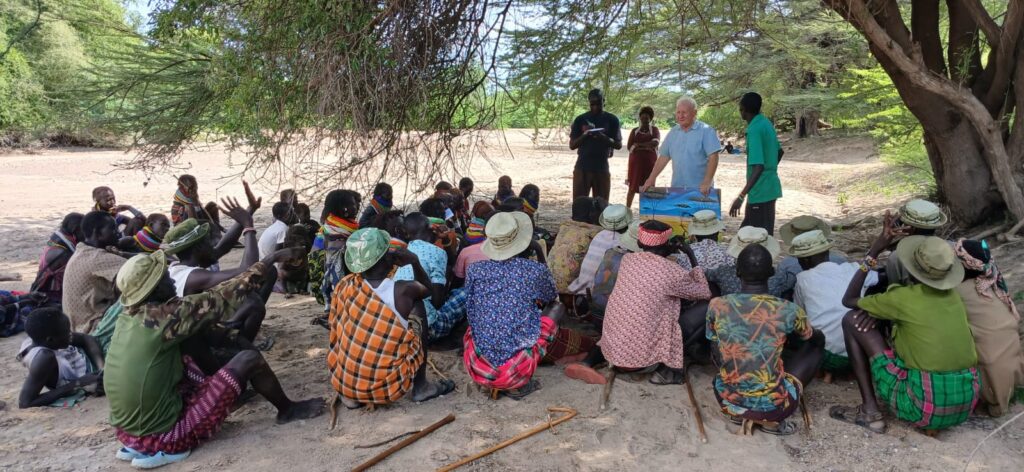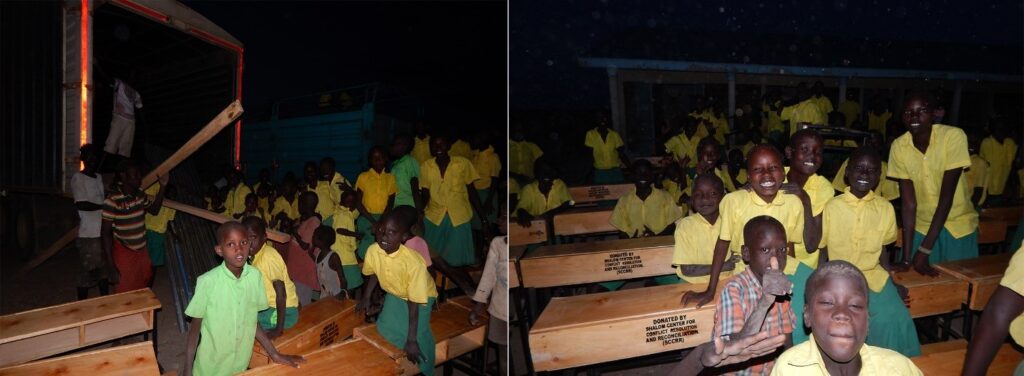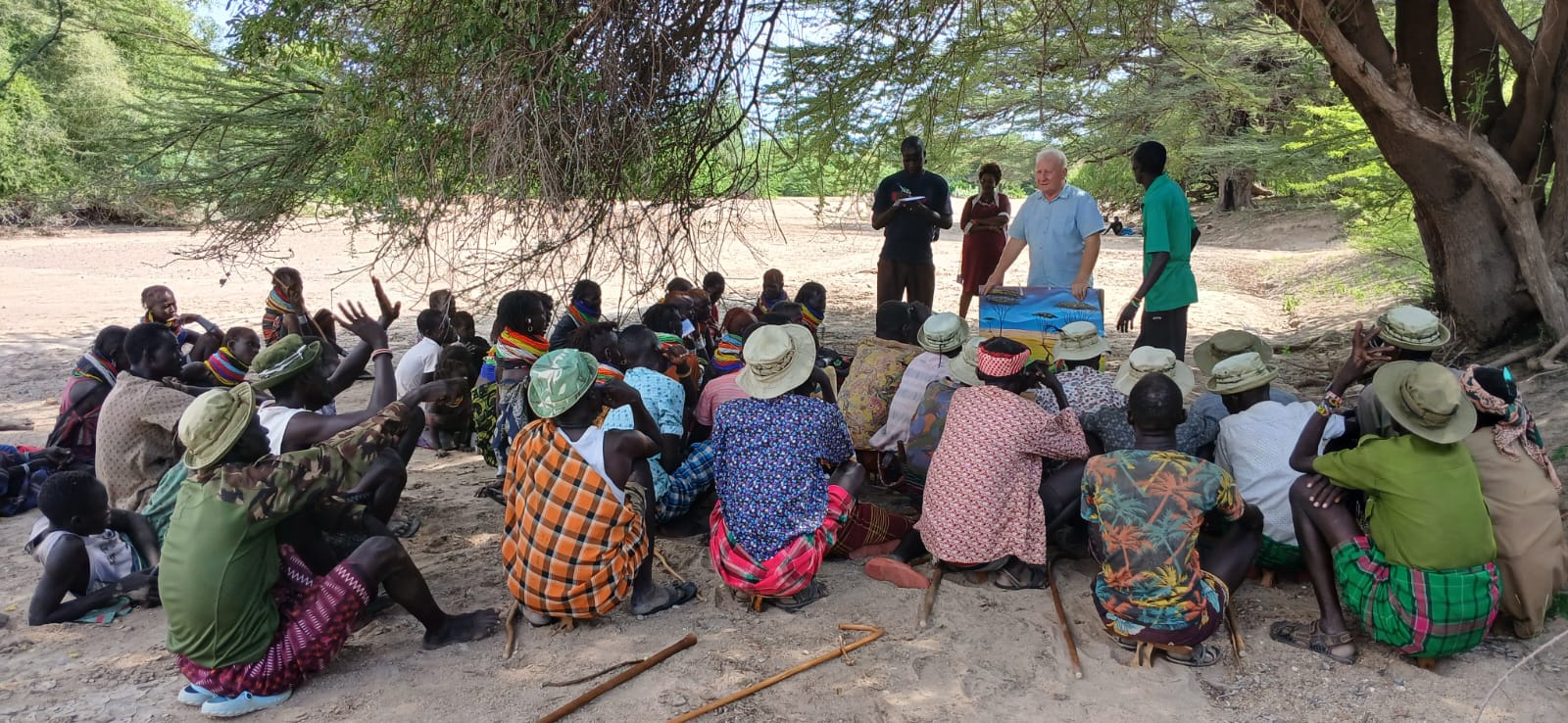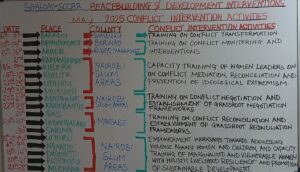By: Arthur Magero Abonyo MA,
“We are thankful to Shalom-SCCRR, your trainings are indeed transformative to communities that have persistently experienced violent conflicts,” attests Everlyne Ebenyo, a trained Shalom peace member from Merikuka Village.

In the rugged and arid region of the Ilemi triangle where Kenya and Ethiopia converge, we find the Turkana and Dassanech communities who are both pastoralist in nature. Peace in this region has for long been a rare and a fragile commodity, as the two communities have endured decades of violent conflicts. These conflicts have often been triggered by competition over scarce resources like pasture, water and lately fishing zones in the shared waters of Lake Turkana. These hostilities have been deeply rooted in both structural, proximate and trigger causes of conflict.
However, amid the persistent cross border violent conflicts in the Ilemi triangle, Shalom-SCCRR was prompted to put in place its unique methodology of intervention, blending it with traditional conflict resolution practices, an approach that looks at the traditional methods of conflict intervention that were successful in the past. These integrative training workshops for conflict intervention are helping the two communities in addressing the immediate underlying root causes of conflicts.
“Before Shalom came, we only knew one way to respond to conflict, that is revenge/retaliation. Now, we have learnt that through negotiation, mediation and listening to each other are essential conflict transformation skill that will help as rebuild our relationship,” shares a participant from Natete village, visibly moved by the transformation within his community.

Through their understanding and recognizing of the impact and relevance of indigenous knowledge of conflict intervention systems, the two conflicting communities are being empowered with the tools for sustainable peace so that they can be the architect of their own interdependent future. This approach brings together elders, youth, and women from the targeted most affected villages that interface in the Ilemi Triangle. The participants are brought together for peacebuilding training workshops across the most susceptible villages namely: Olegech, Ariim, Merikuka, Natete, Liwan, and Maisa in Kenya; and Nyemomeri, Harikol, Salany, Demich, and Kalam in Ethiopia. To date, over 200 key influential Opinion shapers have directly benefited from the trainings on conflict transformation and peacebuilding strategies with over tens of thousands indirectly benefiting from the Shalom-SCCRR intervention along the Ilemi Triangle.
These training sessions have served as platforms for participants to reconnect with ancestral practices of negotiation and mediation that once enabled peaceful coexistence between the two communities. Accordingly, the trained elders recall how disputes were resolved not through violence but through negotiated dialogues facilitated by trusted community leaders from both sides. The trainings have indeed equipped the influential opinion shapers from both communities with essential conflict transformation and peace building skills-including negotiation techniques.
“Long ago, our elders would sit under the acacia tree, talk for hours, and make peace. We can still do it again, thanks to Shalom-SCCRR’s integration of the traditional conflict resolution with the modern conflict transformation approaches,” shared a Dassanech elder during a recent session.

The commendable work by Shalom-SCCRR with emphasis on conflict transformation is indeed changing the way of thinking for conflicting communities in the Ilemi Triangle when it comes to addressing any conflict between them. This has inspired the two communities to focus on rebuilding their relationships, change their perceptions as they aim at ending the inequalities and address the underlying root causes of conflict in the Ilemi triangle.
One Turkana elder puts it aptly saying, “surely, peacebuilding is not a one-time thing, it is a process. We need to walk together as elders, as one people, to change our story, from the story of conflict to a story of peace.”
However, the road to peace in the Ilemi triangle is always faced with challenges as cases of cattle rustling, revenge killings and fear among the two communities often continue to fuel cycles of violence. Shalom-SCCRR on the other hand has stood firm in working to end these cycles of violence in the tribal land of Ilemi Triangle through participatory negotiation and mediation training workshops and forums. This approach has provided a platform for the two communities to explore and reaffirm the indigenous peace building techniques that were instrumental in fostering long-lasting peace in the Ilemi Triangle.
One of the Dassanech elder noted that, long time ago during the time of our grandparents, whenever there was conflict and the two communities desired peace, there was negotiation process that was traditionally fronted by both the Dassanech and Turkana elders. This approach, they noted that, it was of significant help to both communities as they were able to settle their differences amicably.

Indeed, this emphatic discussion on conflict negotiation and mediation methods of peacebuilding process during the workshop trainings on traditional approach of conflict transformation and peacebuilding has been reawakened. Such that, the participants are able to remember how their grandparents successfully used traditional negotiation and mediation techniques to intervene to their conflict and how this resulted into peaceful coexistence among the two communities. Through this trainings, the trained opinion shapers have come to learn the benefits and dividends of peace, as well as the pain and losses experienced as a result of conflicts.
One community member movingly noted “We used to see each other as enemies. But through the Shalom-SCCRR trainings we have recognized that we need to see each other as human being created in the image and likeness of God, as neighbours and as potential friends. When we do this, then the peace we are searching for, we will get it.”
It is so interesting to engage with the participants in the Ilemi Triangle when discussing the various conflict intervention strategies that brought long lasting peace between the Turkana and the Dassanech communities. As another elder from the Dassanech community went on to say, the negotiation and mediation processes of conflict intervention by Shalom-SCCRR have improved our communication, such that each community has acquire the capacity to send the message of peace with an aim of getting to achieve long lasting peace.
One of the trained Shalom-SCCRR Turkana elder on the other hand went on to add that “this conflict intervention approach by Shalom-SCCRR has given us a symbolic gesture for peace, he went further to say that indeed peacebuilding is a process and for us to attain it, we need to get united as elders from the two communities towards the common goal of peaceful coexistence.
Impressed by the Shalom- SCCRR methodology of conflict transformation and peacebuilding Mr. Lorot applauded the approach alluding that, this is a significant approach that came with sincerity and commitment to reconciliation between us the Turkana and the Dassanech community as it is leading us to the restoration of peaceful coexistence among the two communities.

In addition to that, the trained community members have also learnt that reduction of violent conflict among them will contribute in rebuilding their relationship and promote cooperation in areas of trade, schooling and above all grazing together as pastoralist communities. As one of the Dassanech elder remembers, “Long time ago during the time of our grandparents, we used to share water, watched our herds graze together and we too lived in the same villages, now we do not understand the evil spirit that overtook us, we are now divided by fear, suspicion and silenced by constant violent attacks that have made our former neighbours and friends to be our enemies and strangers.
Another female elder responded in support of the Shalom-SCCRR trainings noting that, it is only through the Shalom trainings that we will start listening and learning on how we can rebuild our relationship, their peacebuilding and conflict transformation methodology will indeed, lead us to the day when we will begin to see each other not as enemies of the past, but as partners in a shared future, and thus we will attain the long peace we are talking about.
Beyond training sessions, Shalom-SCCRR’s impact continues to be felt in the Ilemi triangle through different, school educational development projects. Such that Shalom-SCCRR constructed three-roomed house at Omorate in Ethiopia, which provides a safe haven for over 25 schoolboys who previously slept outside. On the same note, a formerly contested kindergarten school was fenced and their classrooms were renovated to protect and offer a more engaging and secure learning environment for the young learners.

In Turkana County, the provision of essential learning materials, building supplies, desks, and sanitary towels has made a significant impact on student retention and academic performance. Schools such as Kokuro Primary, Meyan Primary, and St. Irene Lobur Primary have experienced remarkable academic improvement, as more students prefer to stay in schools which are safer.
“We used to sit on the floor and share books, now everyone has a desk and text books. This has indeed led to improved learning environment as we enjoy sitting on the new desks and in the well-constructed classrooms. Our learning environment is now good and this has made us to effectively engage in our studies with full of love for learning. says a Ekiru a student at Kokuro Primary school.

The presence of Shalom-SCCRR in the Ilemi Triangle has significantly impacted the retention of girls in school, the sanitary towels has been a crucial need for the female students, here in Kokuro we are grateful and thankful to Shalom-SCCRR for supplying us with sanitary towels. This has helped reduce absenteeism among girls as they are now assured that they can attend classes comfortably without worries, attests deputy headteacher Kokuro Primary, Mr. Wakhungu Wafula.
We are grateful to all Shalom- SCCRR donors, friends and supporters for your continued support and generosity, your contribution is well reflected in this transformative process of conflict transformation, peacebuilding and school educational development projects as you continue touching different lives of people in marginalized communities in Eastern Africa.
Author: Arthur Magero Abonyo MA, Shalom-SCCRR Ilemi Triangle Project Officer
Relevant Links
- Kitonga, D. M., Ndiga, B., & Noonan, O. (2025). Contributions of Social Community Structures on Conflict Management among Pastoral Communities in the Ilemi Triangle. Eastern African Journal of Humanities and Social Sciences, 4(1), 68-76. https://doi.org/10.58721/eajhss.v4i1.874
- Kitonga, D. M., & Noonan, O. (2024). Sustainable Conflict Management in the Ilemi Triangle. Journal of Humanities and Social Science. 29(11), 45-53.https://www.iosrjournals.org/iosr-jhss/papers/Vol.29-Issue11/Ser-3/F2911034553.pdf
- Noonan, O., & Bosco, K. J. (2024). The Dynamics of Decision-Making Processes in Sustainable Conflict Management in the Ilemi Triangle. International Journal of Social Science Research and Review, 7(11), 84-96. https://doi.org/10.47814/ijssrr.v7i11.2377
- Macharia, A. (2023). Shalom-SCCRR’s Conflict Resolution Initiatives Bring Hope and Development to Turkana and Dassanech Communities Located in The Ilemi Triangle along the Kenya-Ethiopia border. https://shalomconflictcenter.org/shalom-sccrrs-conflict-resolution-initiatives-bring-hope-and-development-to-turkana-and-dassanech-communities-located-in-the-ilemi-triangle-along-the-kenya-ethiopia-border/
- Osiro, M, & Macharia, A. (2023). Harnessing the Peace Dividends of Shalom-SCCRR’s Transformative Interventions in the Ilemi Triangle; borderline between Omorate in Ethiopia and Kokuro in Kenya. https://shalomconflictcenter.org/harnessing-the-peace-dividends-in-the-ilemi-triangle-along-the-kenya-and-ethiopia-borderline-shalom-sccrrs-transformative-intervention-strategies-in-omorate-in-ethiopia-and-kokuro-in-kenya/
- Devine, P. (2021). In the Peace Dialogue, Issue No. 19, Hekima Institute of Peace Studies and International Relations (HIPSIR): TURKANA-DASSANECH CONFLICT: CAUSES AND CONSEQUENCES. https://shalomconflictcenter.org/wp-content/uploads/2021/02/TURKANA-DASSENACH-CONFLICT-PUBLISHED-BY-HEKIMA-Peace-Dialogue-Issue-19.pdf
- Macharia, A. & Awed, A. (2021). Lazarus Epae Ereng (Assistant Chief, Nachukui-Turkana County) Attest to Shalom-SCCRR’s Impact & Peacebuilding Dividends along the Kenya-Ethiopian border. https://shalomconflictcenter.org/lazarus-epae-ereng-assistant-chief-nachukui-turkana-county-attests-to-shaloms-impact-peacebuilding-dividents-along-the-kenya-ethiopia-border/
- Devine, P. (2020). The Peace Dialogue, Issue No. 19, Hekima Institute of Peace Studies and International Relations (HIPSIR): TURKANA-DASSANECH CONFLICT: CAUSES AND CONSEQUENCES. https://hipsir.hekima.ac.ke/?page_id=626
- Okoth, G. & Erot, P. (2019). Shalom-SCCRR’s International Chairman Intervened to Save the Lives of Lazarus Epae and Paul Agis in the Ilemi Triangle Region. https://shalomconflictcenter.org/wp-content/uploads/2021/02/SHALOM-SCCRR-INTERNATIONAL-CHAIRMAN-INTERVENED-TO-SAVE-THE-LIVES-OF-LAZARUS-EPAE-AND-PAUL-AGIS-IN-THE-ILEMI-TRIANGLE-REGION.-1.pdf
- Macharia, A. (2020). Briefing Paper No. 2: An Analysis of Turkana Dassenach Conflict; Diminishing Role of Traditional Mechanisms in the Management of Pastoralist Conflict. https://shalomconflictcenter.org/briefing-paper-no-2-an-analysis-of-turkana-dassenach-conflict/
- Magero, A. & ILo, J. (2017). Peacebuilding Progress In The Ilemi Triangle: A Story Of Kibish https://shalomconflictcenter.org/peacebuilding-progress-in-the-ilemi-triangle-a-story-of-kibish/
- Devine, P. R., (2009). Turkana – Dassanech conflict: Causes and Consequences. (Unpublished Master’s dissertation). Hekima Institute of Peace Studies and International Relations (HIPSIR), Catholic University of Eastern Africa, Nairobi, Kenya. Available at: https://shalomconflictcenter.org/wp-content/uploads/2021/01/TURKANA-DASSENACH-CONFLICT_CAUSES-AND-CONSEQUENCES.pdf
- Shalom-SCCRR. (2015). Shalom Signs Memorandum of Understanding with IGAD. https://shalomconflictcenter.org/shalom-signs-memorandum-of-understanding-with-igad/
- Haskin, C. (2009). The Ilemi Triangle: A Forgotten Conflict. Conflict. https://shalomconflictcenter.org/wp-content/uploads/2021/02/THE-ILEMI-TRIANGLE_-A-FORGOTTEN-CONFLICT-CHARLES-HASKINS_-2009.pdf
- Erot. P. (2020). Briefing Paper No. 11: Climate Change, Lake Turkana, and Inter-Communal Conflicts in the Ilemi Triangle Region. https://shalomconflictcenter.org/briefing-paper-no-11/
- Macharia, A. (2019). Shalom-SCCRR’s Conflict Research in the Ilemi Triangle: To Empower the Local Ethnic Groups to be the Architects of Their Interdependent Future. https://shalomconflictcenter.org/shaloms-sccrr-conflict-research-in-the-iemi-triangle-to-empower-the-local-ethnic-groups-to-be-the-architects-of-their-interdependent-future/
- Mwangi, F. (2019). The Ilemi Triangle’; Shalom-SCCRR’s Conflict Pre-Assessments with Cross-Border Communities. https://shalomconflictcenter.org/the-ilemi-triangle-shalom-sccrrs-conflict-pre-assessments-with-cross-border-communities/


